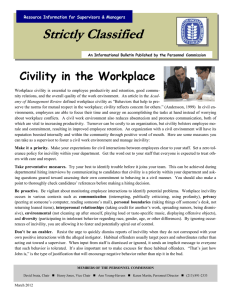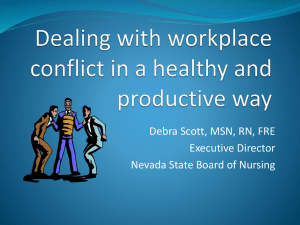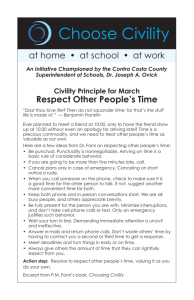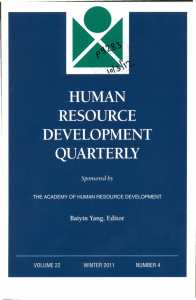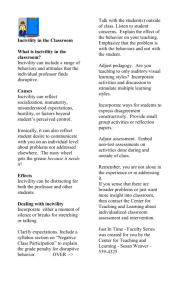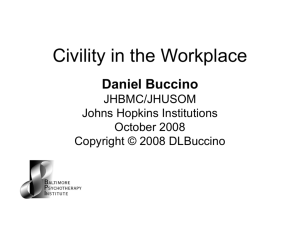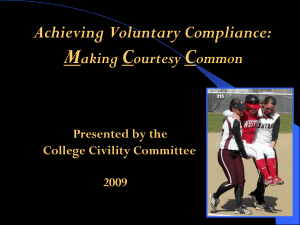C IVILITY IN
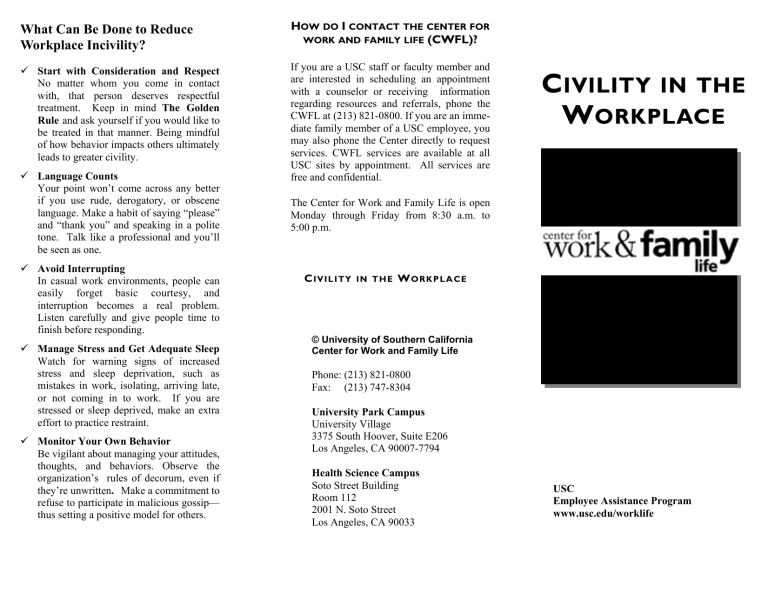
What Can Be Done to Reduce
Workplace Incivility?
Start with Consideration and Respect
No matter whom you come in contact with, that person deserves respectful treatment. Keep in mind The Golden
Rule and ask yourself if you would like to be treated in that manner. Being mindful of how behavior impacts others ultimately leads to greater civility.
Language Counts
Your point won’t come across any better if you use rude, derogatory, or obscene language. Make a habit of saying “please” and “thank you” and speaking in a polite tone. Talk like a professional and you’ll be seen as one.
Avoid Interrupting
In casual work environments, people can easily forget basic courtesy, and interruption becomes a real problem.
Listen carefully and give people time to finish before responding.
Manage Stress and Get Adequate Sleep
Watch for warning signs of increased stress and sleep deprivation, such as mistakes in work, isolating, arriving late, or not coming in to work. If you are stressed or sleep deprived, make an extra effort to practice restraint.
Monitor Your Own Behavior
Be vigilant about managing your attitudes, thoughts, and behaviors. Observe the organization’s rules of decorum, even if they’re unwritten . Make a commitment to refuse to participate in malicious gossip— thus setting a positive model for others.
H
OW DO
I
CONTACT THE CENTER FOR
WORK AND FAMILY LIFE
(CWFL)?
If you are a USC staff or faculty member and are interested in scheduling an appointment with a counselor or receiving information regarding resources and referrals, phone the
CWFL at (213) 821-0800. If you are an immediate family member of a USC employee, you may also phone the Center directly to request services. CWFL services are available at all
USC sites by appointment. All services are free and confidential.
The Center for Work and Family Life is open
Monday through Friday from 8:30 a.m. to
5:00 p.m.
C
IVILITY
W
IN THE
ORKPLACE
C IVILITY IN THE W ORK PLA CE
© University of Southern California
Center for Work and Family Life
Phone: (213) 821-0800
Fax: (213) 747-8304
University Park Campus
University Village
3375 South Hoover, Suite E206
Los Angeles, CA 90007-7794
Health Science Campus
Soto Street Building
Room 112
2001 N. Soto Street
Los Angeles, CA 90033
USC
Employee Assistance Program www.usc.edu/worklife
Civility in the Workplace
•
•
•
•
•
•
•
What is civility? And, how do we practice it among friends and family, and in the workplace?
Being civil means applying The Golden Rule of treating others as you would like to be treated. It means being constantly aware of others and weaving restraint, respect, and consideration into the very fabric of that awareness. Thus, the basis for civility is the demonstration of respect, using courtesy, politeness, and good manners. Put into action and behavior, civility involves:
Saying “please” and “thank you”
Refusing to participate in malicious gossip
Disagreeing with poise, and yielding with grace when losing an argument
Exercising restraint
Listening to understand and help
Acknowledging mistakes
Being tolerant of differences
In any given situation, we have the choice to stop and think before we act, the opportunity to exercise restraint. Restraint is our “inner designated driver.” Instead of rushing blindly into action, and perhaps saying something we might later regret
(an uncivil action), we can ask ourselves:
•
Do I really want to say or do this?
•
Is anybody going to be hurt by this?
•
Will I like and respect myself later for having done or said this?
Exercising restraint, and being civil and respectful, allows us to make better decisions.
•
Imagine being stuck in traffic, and exercising restraint not to drive ahead of others down the emergency lane
•
Picture waiting patiently for a parking spot, but not reacting when someone sneaks in and takes it
•
Envision yourself feeling very angry at someone, but refusing to start a shouting match with that person
Restraining ourselves and choosing to act civil in these types of situations allows us to feel good about ourselves later, and avoid an escalation of conflict.
What is Incivility?
Incivility, by contrast, implies rudeness and disregard for others in a manner that violates norms for respect.* Further, uncivil behavior can be defined as actions or verbal exchanges that are considered dismissive, threatening, demeaning, or inappropriate. Incivility creates an unpleasant work environment where people simply stop doing their best. Victims of incivility sometimes take out their frustrations on clients and customers, creating a ripple effect. Absenteeism climbs and productivity plummets.
* Stephen Carter in Civility: Manners, Morals and the Etiquette of Democracy.
Impact on the Workplace
Examples of Uncivil Workplace Behavior
Incivility is widespread in the workplace . For example , employees may act annoyed when someone asks them for help, treat others as if they were invisible (by not speaking to or ignoring them), belittle colleagues behind their backs or admonish them in public, take credit for someone else’s work, or use foul language as a means of expressing themselves. Some other examples of workplace incivility include:
•
Sending combative, emotional, or ambiguous email messages
•
Gossiping, backbiting, criticizing, blaming
•
Violating trust
•
“Humorous” put-downs, eye rolling, heavy sarcasm, derogatory remarks
•
Taking others’ food from the refrigerator
•
Not turning off a cell phone, or answering calls, in meetings and common areas
•
•
•
Not returning emails or calls, hiding behind voice mail, not keeping appointments
Not reciprocating greetings in the hallway or elevator
Setting impossible deadlines for subordinates and colleagues
Factors Affecting Incivility
What makes people act uncivil? Workers who behave in an uncivil manner are not necessarily “bad” people. Rather, research has indicated that specific conditions contribute to incivility, such as:
•
Feelings of Powerlessness
When people feel as if they have no control, or don’t feel supported, some form of aggressive or passive/aggressive behavior can follow to make up for the feeling of powerlessness.
•
Stress and Frustration
People are less likely to be tolerant, compassionate, and patient—and are less likely to practice restraint—when they are experiencing high levels of stress.
•
Sleep Deprivation
According to a study by the National
Sleep Foundation, 63% of Americans do not get the amount of sleep recommended for good health, safety, and optimum work performance. Sleep deprivation can then affect behavior, increasing the chance that someone will lose patience or
“lash out” in an uncivil manner.
•
Greater Informality
Our society has become more casual, and as a result, we may relax our manners at the same time.
•
Abuse of Power
Those with greater power have more opportunities to be uncivil, and this behavior may continue unchecked because no one has the authority to hold them accountable.
